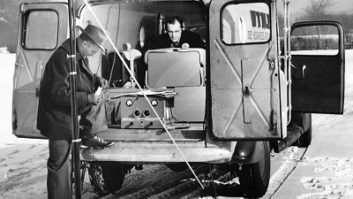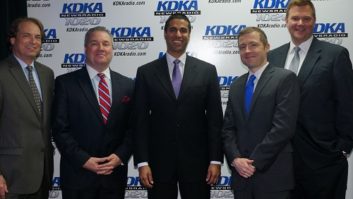Sadly, chances are someone has stolen from your radio station or broadcasting equipment business.
It may have been an isolated instance, it may be widespread and ongoing, but statistically, it has happened. Even worse, receding prosperity in our troubled economy may be to blame for a dramatic increase in theft losses.

iStockphoto/joaquin croxatto Even a business with no physical merchandise, no face-to-face cash transactions, may be susceptible to other forms of business theft and fraud. In fact, the U.S. Small Business Administration estimated in a 2008 report that, even when retail theft such as shoplifting is included, two-thirds of business thefts are employee thefts rather than thefts or fraud committed by outsiders.
That’s right, massive losses such as those in the Madoff case and the subprime meltdown have made the headlines, but it is often the unsuspected threats such as embezzling employees, thieves, forgers and other cheats that threaten the financial health of many businesses. There’s no reason radio can be considered exempt.
Discovery of betrayal by a trusted employee or business associate typically leads to disbelief, shock, anger and shame.
Paralysis is understandable after the fact. However, actions taken before might have prevented the loss; insurance might help make the broadcasting operation whole; our tax laws will ease the bite of theft or fraud losses; and prompt action when the loss is discovered will not only mitigate its impact but can facilitate recovery.
Embezzlement and theft
Ask the average owner or manager if he or she is concerned about embezzlement or employee theft and the likely response will be “I don’t have to worry about that because:
“My employees are all good, honest people.”
“We’re just a small company.”
“My people have all been with me a long time, so I know whom I can trust.”
“We don’t handle cash.”
If your answer matches any one of these statements, you are probably operating under a few misconceptions that could prove expensive to your business. If you think embezzlement or employee theft will never happen in your broadcast business, think again.
Security experts say that as many as 30 percent of the average business’s employees do steal, and another 60 percent will steal if given a motive and opportunity. Some estimates indicate that more than $600 billion is stolen annually, or roughly $4,500 per employee. According to the U.S. Department of Commerce, about a third of all business failures each year can be traced back to employee theft and other employee crime.
Insure
Because stealing can cost your operation a lot of money, the best way to avoid employee theft is to take steps to prevent it from ever happening. See the tips in the box for suggestions.
But because employee theft or dishonesty can severely damage any radio station’s bottom line or credit, create adverse publicity and disrupt operations, it’s also almost a necessity to insure the operation from the employee who endangers the financial stability of the operation by stealing funds, equipment or proprietary information.
When it comes to buying insurance however, the owners and managers of many businesses are finding out what it feels like to be a teenager seeking an automobile liability policy.
Insurers are cutting back on the amount of general liability coverage they will issue and, in some cases, raising rates sharply.
Fortunately, “shopping” for available, affordable insurance such as “fidelity” insurance provides several options.
Fidelity liability insurance provides coverage for the loss of money, securities or property due to employee theft. The term “employee” can include a non-compensated officer of the company, former employees, temporary personnel, directors or trustees as well as regularly employed personnel.
Some fidelity liability policies also insure against losses resulting from employees by computer theft or electronic funds transfer fraud, and they cover employee dishonesty (required by ERISA) for the company’s employee benefit plan. If the policy does not address these additional areas, protection can be purchased separately as:
— Commercial crime coverage, which covers money and securities, stock and fixtures against theft, burglary and robbery both on and off the insured premises and from both employees and outsiders, or
— Fidelity bonds, which cover business owners for losses due to dishonest acts by their employees.
Proper steps, proper time
It should come as no surprise that insurance companies often deny or limit claims based on policy language or challenges to the policy itself. Thus, upon learning of a loss due to theft or fraud, a broadcasting business owner or manager should:
— Immediately notify the insurance company, even if the full details remain to be determined. Many insurance companies specify a period within which notice must be given.
— Conduct an immediate, discreet investigation focusing on the scope of the loss, the identity of participants and the disposition of the stolen assets.
— Implement immediate safeguards to prevent further losses.
— Garner information for a fraud audit and an asset seizure auction.
— Attempt to interview, secure a statement and secure restitution from any dishonest employees.
— Terminate dishonest employees.
— Prepare and submit a “proof of loss” regarding the insurance claim. Most insurance policies have a specific time period within which a sworn proof of loss must be submitted; policyholders should comply or obtain a written extension. The initial submission may be supplemented, if the full nature or extent of loss is not known by the deadline.
— Set a target for the earliest date when a lawsuit may be filed. Many fidelity insurance policies state that an action against the insurance company must be commenced within two years of discovery of a covered loss.
Throughout, the station or broadcasting business owner or manager should remember:
— Do not make any promises to the dishonest employee that you will refrain from contacting the authorities;
— Do not waive or release any claims against the dishonest employee or potentially secondary responsible parties without complete restitution; and
— Do not settle with any party without first contacting the insurance company.
Recovery via tax losses
Prevention First
While these steps are not foolproof, they can offer a measure of protection against employees raiding the till:
— Perform background checks of prospective employees
— Consider giving an “honesty test,” a standardized, commercially available written test. On the downside, these tests are often inaccurate and may violate privacy and civil rights, although they do help keep out people with a propensity to steal
— Supervise your employees
— Cultivate conducive, employee-employer relationships
— Appropriately assign and separate employee responsibility, accountability and authority
— Institute procedural controls involving receipt and payment of funds
— Separate the functions of purchasing, ordering, receiving and payment.
— Institute protection measures (locks, alarms, safes, security guards)
— Continually monitor and evaluate your business operations, making it hard to steal, and
— Show a willingness to prosecute employees caught stealing Although lost profits are not tax deductible, Uncle Sam, in the form of our tax rules, stands ready to help every broadcasting business cope with theft and fraud losses. Theft losses generate embezzlement tax deductions.
Under our tax rules, theft is defined as the taking and removing of money or property with the intent to deprive the owner of it. In the fine print, it reads, “The taking of property must be illegal under the law of the state where it occurred and it must have been done with a criminal intent.”
Theft losses, like most types of losses, are usually tax deductible in the year sustained. However, under the tax rules, theft losses are actually “sustained” in the year when the station owner or manager discovers the loss. Thus, a theft loss is not deductible in the tax year in which the theft actually occurs unless that also happens to be the year in which the loss was discovered.
Going one step further: If in the year of discovery a reasonable possibility of reimbursement for any loss exists, the deduction cannot be taken until that reimbursement is actually made or ruled out as likely. Remember, the basic rule states that in order for losses to be deductible, there must be a “closed transaction.”
In order to deduct a theft loss, a business owner or manager must be able to show there was a theft as well as support the amount claimed as a deduction. For a theft loss, this means being able to show the following:
— When it was first discovered that property was missing
— That your property was stolen
— That you were the owner of the property
— Whether a claim for reimbursement exists for which there is a reasonable expectation of recovery.
The cost can be steep — and, in instances of employee thefts such as embezzlement, devastating.
The way the broadcasting operation protects itself before such losses occur, maintains insurance protection, reacts to the theft and understands the recovery possibilities offered under our tax laws are important. Also important is the range of professional advice available every step of the way.
Mark Battersby is a tax and financial writer based in the suburban Philadelphia community of Ardmore, Pa.










